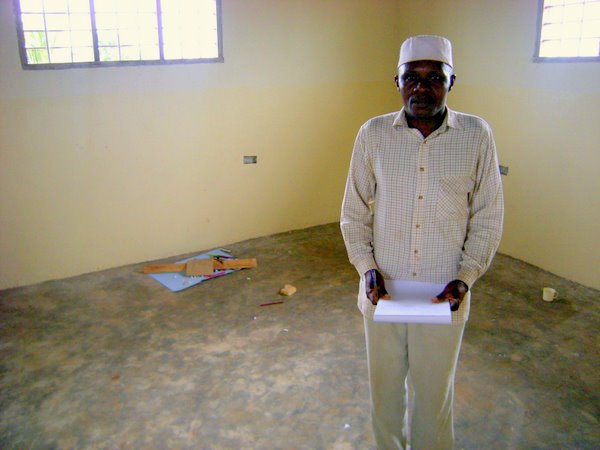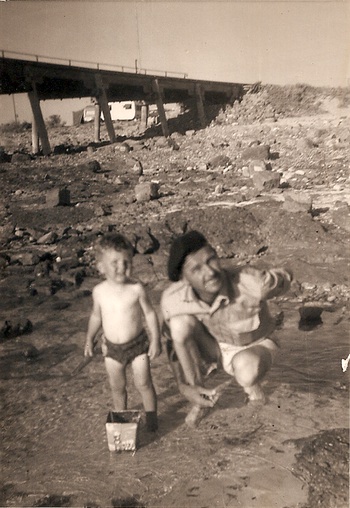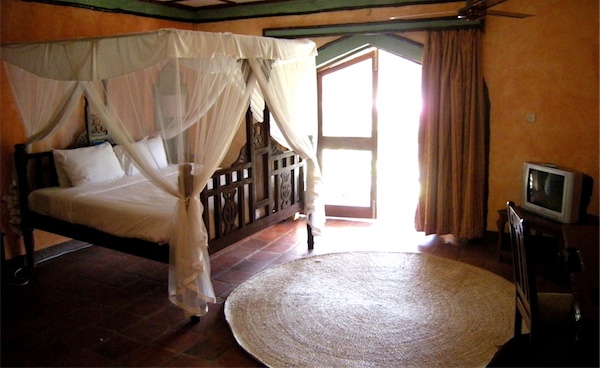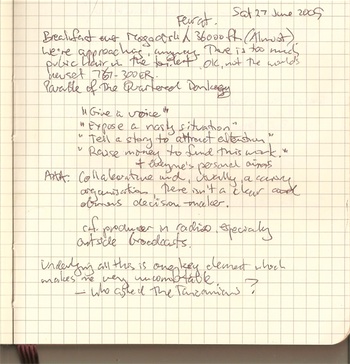
This is Juma Hassan lila Kalibu, secretary of Kilimani [see update below] village in Zanzibar, showing off the village school’s new computer room. As you can see, it has no computers. Or electricity. Or desks. Or chairs. Or anything, really.
When I visited this village last Sunday as part of ActionAid Australia‘s Project TOTO — this school is one of their projects — it was a striking example of what we’d been discussing the previous day with ActionAid’s Zanzibar team: the poverty web. You can’t just dump one single piece of modernity into the poor rural environment and expect everything to work. As James Burke’s classic TV series Connections showed, modern Western civilisation is a built on a web of interlocking technologies, processes, structures and institutions, and you need all of them to make things work.
Kilimani has none of them.
Kilimani is literally a series of mud-brick huts. I’ll post more photos later — but this school, with its concrete floor and rendered walls, is as far ahead of the villagers’ homes as a medieval cathedral was ahead of the peasant hovels that clustered nearby. It’s appropriate, I think, that everywhere I’ve travelled in Tanzania, education is seen as the key to future prosperity. Well, not prosperity exactly, but whatever’s one notch up on the scale from abject poverty.
Consider this. Computers need electricity, amongst other things. Even if you string in the wires to connect this village to the power grid, someone might decide that the scrap metal value of the copper wires is more important to them than the electricity right now. A family in poor parts of the Tanzanian mainland might have a total annual cash income of TZS 150,000. That’s about AUD 120. When you only have $10 a month, a couple dollars of copper represents significant wealth — and at the mine we visited in Nzega in northern Tanzania yesterday they have to post guards to stop people stealing the water pipes and fences.
OK, assuming the wires and transformers aren’t stolen, what happens when something breaks? Who’s paying for the spare parts? Who’s trained to do the work? What use is a technical college when there are no teachers? Who’d come to work as a teacher when the homes have no electricity or running water? A basic education is a pathway out of here! So you need electricity to attract the teachers to… um, but that’s where we started!
How do you unravel this poverty web? Buggered if I know! But that’s the challenge facing countries like Tanzania. Hundreds, perhaps thousands of things we take for granted in the West simply aren’t there, and all the things you need to build those things are not there. They could be bought, sure, but there isn’t the money.
Money. There you have it.
Juma Hassan lila Kalibu, dressed in his Sunday best to greet his honoured guests, is certainly proud of his school, the most magnificent building in the village. And he would like our help. Some paper would be nice. And some pens.
[Update 13 June 2010: I have just discovered that this village is not called Kilimani at all. Kilimani is the location of the Zanzibar Beach Resort, just south of Zanzibar Town. That’s the hotel where we stayed overnight in Zanzibar — and be warned, their web is a dreadful slow-to-load Flash job with looping music that can’t be turned off. It’s quite possible this village is called Kisimani, located here on Google Maps and not marked at all on Bing Maps. I will investigate.]





